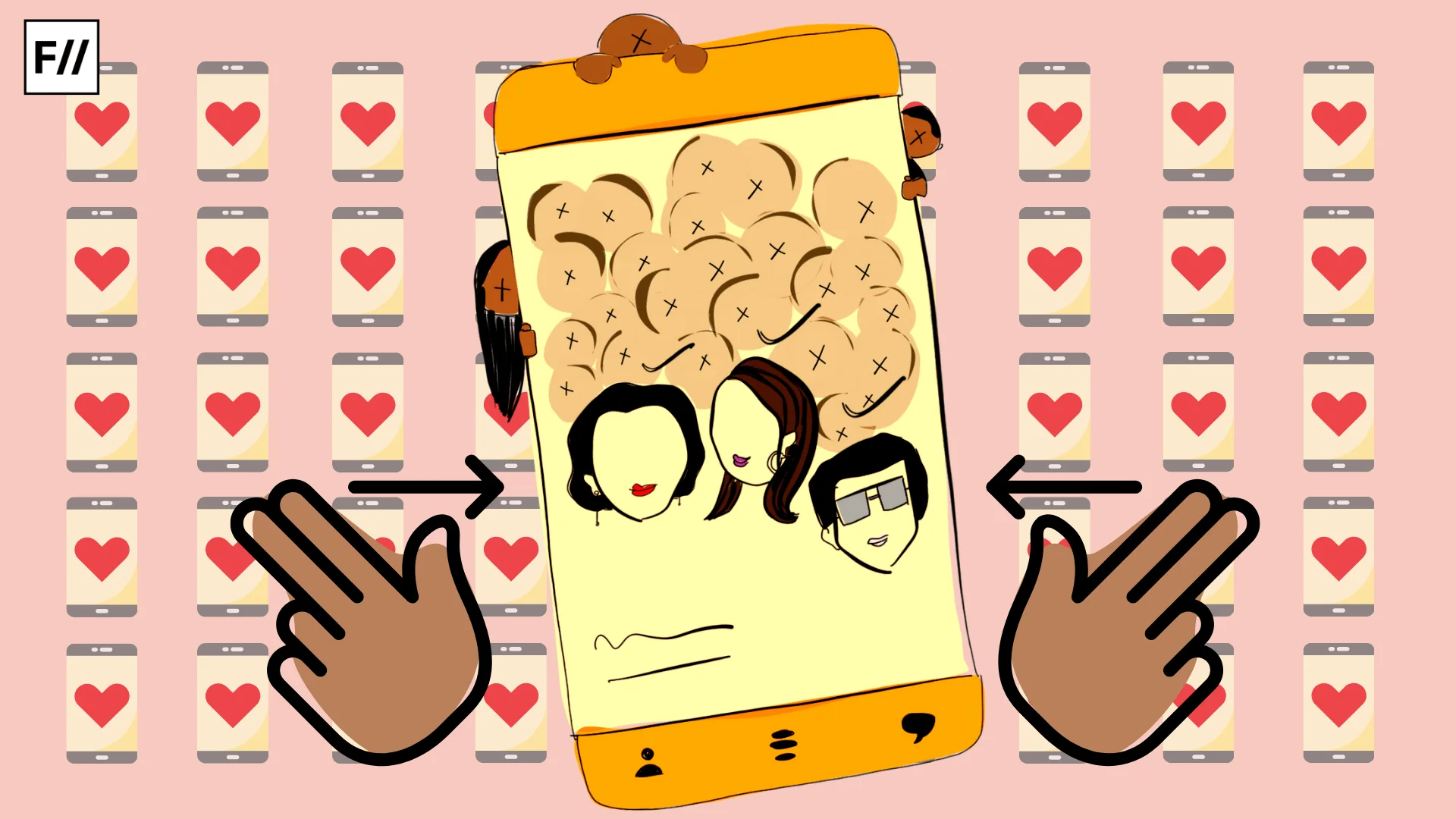Editor’s Note: This article is part of a campaign titled #JustNotInterested, run jointly by Feminism in India and Tinder India, to unpack and understand consent, disinterest and expectations in relationships. The campaign curates conversations on Instagram stories on various facts of modern relationships. This article is based on one of those conversations.
Stigmatization of the word ‘no’
The word ‘no’ has gained the reputation of being a ‘bad’ word, almost alongside the category of curse words. New parenting methods discourage direct refusal of demands by saying no, employees often do not refuse a higher workload due to the inability to say no, relationships are based on the problematic foundation where no is not spoken, not heard and not understood.
Since when did the word ‘no’ come to be associated with such negative connotations? It is a word which stands for agency in its essence. It conveys refusal, denial, disbelief and disagreement – all common and acceptable emotions that anyone is bound to feel. Then why do we have a problem with directly saying no or accepting no for an answer in relationships?
Socialization and the N-word
In the Netflix series Workin’ Moms, an episode starts with a discussion on how mothers avoid using the C-word (can’t) and the N-word (No) with their children as they find it to be overtly negative. A similar scenario is also portrayed in the popular TV series Modern Family where a gay couple tries to avoid using no with their rebel daughter.
relationships are based on the problematic foundation where no is not spoken, not heard and not understood.
Does the stigmatisation of no start within the family? Saying no sets boundaries. It limits the extent to which someone can exercise their will over the other. When such boundaries aren’t set in relationships, be it romantic or not, it often leads to oppression of one of the parties.
The importance of understanding, respecting and communicating no is paramount in any relationship. However, when the word is laced with negative connotations and is avoided like plague since childhood, communicating disinterest and disagreement becomes a complicated a task.
Last week, Feminism in India hosted an Instagram chat that asked why we had such a problem with directly saying or accepting no for an answer in relationships. Why do people feel the need to make up boyfriends, girlfriends or strict families in order to turn someone down? Why do people not take the first ‘no’ at face value?

Ideologies which promote resilience such as ‘never give up’ can be appreciated when applied to professional endeavours, but not in relationships when disinterest is clear. In FII’s Instagram chat that discussed our inability to say no in relationships, one respondent said, “Since we were kids we’ve been taught that persistence, ambition and determination are admirable qualities. That ‘not giving up’ is how you achieve your dreams. Most guys I’ve said ‘I’m not interested’ to have continued asking me out for parties or inviting me for dinner or even sending my favourite food to office. They simply don’t understand no and when I say I’m seeing someone else, they back off. It leads me to a conclusion that they respect another male more than the wishes preference of the women.”
This brings us to the gendered aspect in this stigmatisation of no. It is the male child who is taught to be more determined and goal-oriented with the “never take no for an answer” and “never give up until you achieve your dreams” attitude whereas women are taught to be polite and to be considerate of other’s feelings before their own. Another respondent put this gendered dimension of no eloquently, “For years men have been taught to pursue. Pursue past the no. So they can’t take the no. So they can’t accept it and they fail to understand it. And women have been taught to be kind and sweet and not hurt others feelings. So they don’t say no directly.”

The source of the gendering and stigmatization of ‘no’ may be found in the early stages up socialization within the family. However, one must not forget that the child is socialized according to the morals and values already accepted by the society at large; and in this society no is not said, heard or understood.
Also read: Home Is Where Consent Goes To Die

Rejection hurts
“There is hesitation in saying (no) because I might end up hurting the person.”
“We’ve been conditioned to think that saying no is being disrespectful and hurting the other person and their feelings. Saying no is equated with being stone-hearted.”

A few of our respondents pointed out the most common reason behind our inability to say no directly – it hurts the feelings of others. This is exactly where the problem lies in our relationships. Why is no stigmatized to such an extent that people can’t hear it without feeling like it is the end of the world?
Refusing to do something that one is uncomfortable with takes courage, and this courage should be admired, not refuted. In any kind of relationship, whether romantic or platonic, zero space for dissent, refusal and disagreement can be suffocating. One must not have to stifle their own needs and aspirations due to the fear of hurting the other person; love cannot exist with this sense of entitlement.
Why is no stigmatized to such an extent that people can’t hear it without feeling like it is the end of the world?
This is why there is a need to re-analyze what constitutes a healthy relationship and make space in it for disinterest. If saying and receiving ‘no’ is normalized instead of stigmatised, we’d have much healthier relationships without the fear of hurting the other person’s feelings.
Dealing with, understanding, accepting and respecting refusal finds a skewed image in our society. Many of the respondents pointed out how Bollywood popularises the notion of ‘No means keep chasing’. One of the respondents noted that “Most movies, books and other forms of media teach us that the first ‘no’ means that some more convincing will eventually lead to a yes. Chasing is considered romantic.”

With Bollywood spearheading the popularisation of stalking and threats as romantic, it is not surprising that we don’t see a healthy culture of dealing with rejection. There is a need to let go of the idea that persistence is romance and inculcate the notion that ‘No means no’ among the audience to cultivate healthier relationships.
Also Read: Understanding Consent Beyond “Yes” Or “No”
The right to say ‘no’
“About 4 years ago one of my close male friends proposed to me and I said no. I suggested we remain friends but he stopped talking to me….a year later he killed himself because of study pressure (as he wrote in his note) but his sister kept messaging me that somewhere even I was responsible for it. It made me feel terrible.”
This personal experience of another respondent shows all that is wrong with the way we deal with rejection and emphasises on the need to build a healthier consent culture. Unhealthy ways of dealing with being turned down include stalking, threatening and self harm, which affect not only the person who was turned down, but also the person who exercised their right to say no.
It is important to build a safe atmosphere where a person can exercise their right to say no without any guilt or fear. Being stuck in a relationship due to fear or guilt is not healthy. As one respondent said, “We’ve been made to believe that love is about the pursuit. The entire story is about how you get the partner and very conveniently, everything else is ‘happily ever after’.” How healthy are relationships where one person tries and tries until they “get” the other person? As soon as there is acceptance of the fact that no is not bad, we can move towards normalising disinterest and creating healthier relationships.
Featured Image Source: Olha/Adobe Stock
About the author(s)
Anisha Maini is a student of Sociology at Jesus and Mary College. She is always ready for a lively discussion on literature, existence of aliens, gender, philosophy, met gala outfits, environment, sexuality, meaning of song lyrics, culture and game of thrones; all over a cup of tea. She believes she'll make a difference.




